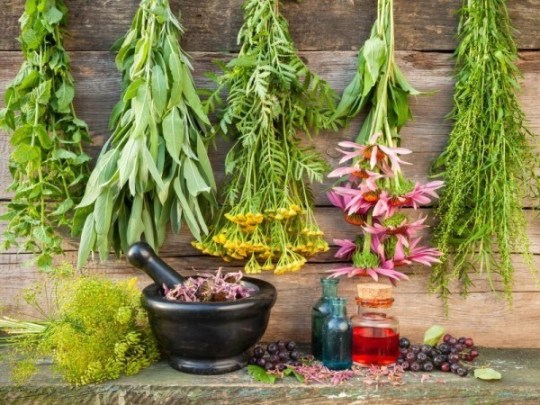Photo

A Practical Guide to Herbology
Lesson One: Medicinal Teas
When I was first starting out with herbology, I was living in a small village in Croatia with a total population of less than 100 people. We depended on homemade teas, salves and medicines to heal us since the nearest hospital was two hours away. We treated ourselves with the power of herbs, gifted to us by the Earth.
These days, we can purchase all the tools we need to grow both common and exotic plants. Dried herbs are also another good option, especially for those that cannot grow their own. And with these tools, we can craft our own medicines.
For the first lesson, I’m going to focus on something simple: the art of crafting medicinal tea.

Creating Tea Blends
When starting out with creating medicinal teas, it’s important to understand how each ingredient interacts with our bodies. Be sure that you’re not allergic to any of your herbs and that they won’t interact poorly with any prescribed medications that you’re on. For example, those who are diabetic should not take angelica root; folks who are allergic to ragweed should avoid chamomile.
Here’s a list of common herbs and their functions for the purposes of crafting medicinal teas:
Angelica Root: Soothes colds and flu, reduces phlegm and fever. (Do not use if you are diabetic)
Basil: Eases headaches, indigestion, muscle spasms, insomnia; reduces stress and tension
Blackberry Leaves or Roots: Reduces diarrhea
Catnip: Soothes teething pain, colic, diarrhea, indigestion, anxiety, insomnia. (May cause drowsiness. Avoid if on Lithium or sedatives)
Calendula (marigold): Reduces fevers, soothes indigestion, gastrointestinal cramps, flu; antiseptic. (May cause drowsiness. Avoid if on sedatives)
Cayenne Pepper: Soothes coughs, colds, arthritis (topical), nerve pain, fever, flu; expectorant. (Avoid taking with medications that contain Theophylline).
Chamomile: Reduces insomnia, anxiety, stress, fever, indigestion; aids with sleep and pain relief. (May decrease effectiveness of birth control pills and some cancer medications, may increase the effects of warfarin; avoid if you are taking medications for your liver)
Cinnamon Bark: Soothes sore throats and coughs; anti-inflammatory (Avoid taking with diabetes medications)
Dandelion Root: Detoxifying, aids digestion, relieves constipation, laxative. (Avoid if on antibiotics, lithium or water pills)
Dandelion Leaf: Mild diuretic, potassium-rich (Avoid if on medication for liver)
Elderberries: Wards off colds and flu
Ginger: Eases morning sickness, nausea, colic, indigestion, diarrhea, fever, sore throats. (Avoid taking with medications that slow blood clotting)
Ginkgo: Relieves anxiety, vertigo, tinnitus; improves circulation, helps concentration; helps PMS. (Avoid taking with ibuprofen or with medications that slow blood clotting; numerous medications have interactions with ginkgo so speak to your specialist before use)
Ginseng: Aphrodisiac, mild stimulant, boosts immune system. (Do not take with medications that slow blood clotting, and avoid taking with diabetes medications or with MAO inhibitors)
Goldenrod: Relieves gout and cramps
Lavender: Reduces anxiety, headaches, tension, stress, indigestion, IBS; antibacterial; antiseptic; disinfectant (May cause drowsiness; avoid if on sedatives)
Lemon balm: Relieves anxiety, cold sores, colic, insomnia, restlessness, indigestion; boosts memory (May cause drowsiness, avoid taking with sedatives)
Nettle: Reduces hay fever and arthritis; diuretic. (Avoid taking with diabetes medications, medications for high BP, sedatives, medications that slow blood clotting, and lithium)
Peppermint: Relieves nausea, anxiety, indigestion, IBS, colic, diarrhea, fever, coughs, colds; anesthetic (Avoid if you have acid-reflux disease; avoid taking with cyclosporine; avoid if on liver medications)
Pine Needles: Expectorant; antiseptic; relieves coughs, colds, fever and congestion
Rosemary: Improves focus, memory, concentration, BP, circulation; antiseptic; antidepressant; eases indigestion
Thyme: Antibacterial, antiseptic, eases coughs and colds, expectorant (Do not take with medications that slow blood clotting)

Recipes
For those starting out, here are a few recipes for common ailments. As you start making your own teas, you’ll learn which blends of herbs work best for your body. Keep track of which ingredients and combinations are successful - with each steep, you get closer and closer to crafting your perfect personalized medicine cabinet.
Anxiety Relief
- ½ tsp chamomile
- ½ tsp lemon balm
Cold Relief
- ½ tsp elderberry flower
- ½ tsp thyme
Mood Booster
- ½ tsp lavender
- ½ tsp catnip
- ½ tsp rosemary
Cramp Relief
- ½ tsp basil
- ½ tsp calendula (marigold)
- ½ tsp goldenrod
Indigestion Relief
- ½ tsp ginger
- ½ tsp lemon balm
- ½ tsp peppermint
Expectorant
- ½ tsp pine needles
- ½ tsp nettle leaf
- ½ tsp angelica root
Insomnia
- ½ tsp chamomile
- ½ tsp catnip
- ½ tsp lavender
Sore Throat Relief
- ½ tsp cinnamon (or half a stick)
- ½ tsp ginger
- 1 tbsp honey
Fever Break
- ¼ tsp cayenne pepper
- ½ tsp angelica root
Flu Relief
- ½ tsp calendula (marigold)
- ½ tsp lemon balm
—————————————————————————–
Photographs are under the Creative Commons License. Content is from my grimoire and is embedded with information from a variety of sources over the years.
Updated 7 March 2018 with relevant warnings and to be consistent with other posts in this series.
Warnings: All plant material should be sourced appropriately and responsibly for your own safety and well-being. Be certain that you are purchasing food-grade ingredients from a reliable retailer or supplier. Along these lines, not all dried herbs are meant for consumption so please be on the lookout for “external use only” labels - you do not want those products for this.
Do your own research regarding medicinal plants and usage, especially if you are sensitive or have allergies of any kind. If you are on medication(s), consult a doctor before use.
Finally, medicinal teas are a health supplement and not a substitution for professional medical and psychiatric aid. If you are experiencing any prolonged health and/or mental health issues, SEE A DOCTOR.
20K notes
·
View notes
Text
youtube
#foodvlogger#photography#food#foodblogger#health & fitness#healthy eating#whatieattoday#vlog#avocadotoast#smoothiebowl#smoothie#pizza#feedfeed#vscofood#like4like#like4follow#like4reblog
0 notes
Text

1 note
·
View note
Text

0 notes
Text

#vegan#veganrecipes#vegansofinstagram#plantbased#vegetarian#foodblogger#food#health & fitness#health#healthy eating#saladbowl
0 notes
Text

0 notes
Text

1 note
·
View note
Text

1 note
·
View note
Text

0 notes








